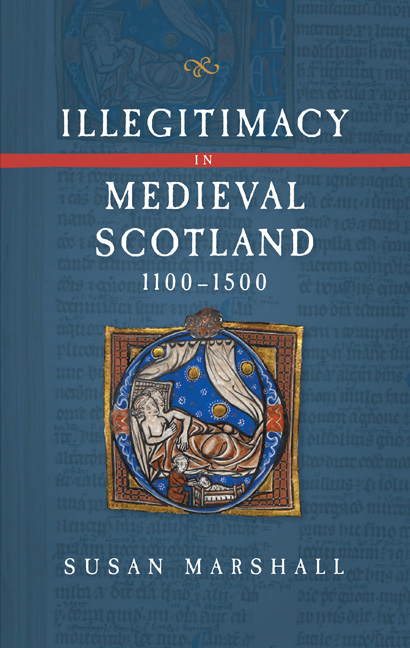Book contents
- Frontmatter
- Dedication
- Contents
- List of Tables
- Preface
- Acknowledgements
- Abbreviations
- Introduction
- 1 Church law and Scottish Families
- 2 Illegitimacy and Inheritance
- 3 Illegitimacy and Royal Succession I: Before the Great Cause
- 4 Illegitimacy and Royal Succession II: from the Great Cause to James I
- 5 Wives, Daughters, and Sisters
- 6 Church Careers and Sacrilegious Bastards
- 7 Illegitimacy in Political Life
- Conclusion
- Appendix I Scottish kings and their illegitimate offspring
- Appendix II Illegitimate sons of Scottish kings
- Timeline of key events
- Bibliography
- Index
7 - Illegitimacy in Political Life
Published online by Cambridge University Press: 26 March 2021
- Frontmatter
- Dedication
- Contents
- List of Tables
- Preface
- Acknowledgements
- Abbreviations
- Introduction
- 1 Church law and Scottish Families
- 2 Illegitimacy and Inheritance
- 3 Illegitimacy and Royal Succession I: Before the Great Cause
- 4 Illegitimacy and Royal Succession II: from the Great Cause to James I
- 5 Wives, Daughters, and Sisters
- 6 Church Careers and Sacrilegious Bastards
- 7 Illegitimacy in Political Life
- Conclusion
- Appendix I Scottish kings and their illegitimate offspring
- Appendix II Illegitimate sons of Scottish kings
- Timeline of key events
- Bibliography
- Index
Summary
Now am I sicker tairof for tow art he
To myne are succeid suld efter me.
In the late twelfth century Ness, son of William of Leuchars, had two sons, Caustantin and Patrick, but it was his daughter Orabilis who inherited his extensive lands in Lothian. The brothers are acknowledged as sons of Ness, but Orabilis is given in charters as Ness's heir. It seems that she alone of the three was legitimate. Her father was evidently committed to the principle of legitimacy as a prerequisite for inheritance, since female inheritance was often avoided where possible. Orabilis's own great-granddaughter, grandchild of her son Saer de Quincy, was the heir of line to the earldom of Winchester, but the earldom was diverted instead to Saer's second son rather than to a female heir.
The spread of legitimate primogeniture displaced some who might have expected to inherit, whether as collaterals or as children of unions not recognised as marriages under canon law. In 1213, William the Lion and his son Alexander presided over arbitration to settle a dispute between two brothers, both called Maurice, over the earldom of Menteith. The older Maurice was in possession of the earldom but the younger claimed it by hereditary right. Although the source of his claim is not recorded, Barrow points out the likeliest explanation is that the younger son was legitimate while the elder was not. If this was the case, William was enforcing law that insisted on legitimacy as a qualification for inheritance, even though a traditional succession practice allowing the illegitimate son to gain control of the property had already been implemented. In the event, the elder Maurice resigned the earldom to the king, who granted it to the younger brother. Maurice senior was permitted to hold some of the lands of the earldom by bailliary of the king, on the understanding that these lands would revert back to the rightful earl on the death of the elder Maurice; and the latter was also granted additional lands to use as marriageportions for his daughters. By this agreement the former earl was able to continue to derive an income from the earldom, and to preserve family honour by dowering his daughters with land in the way expected of a man of his social standing.
- Type
- Chapter
- Information
- Illegitimacy in Medieval Scotland1100-1500, pp. 173 - 190Publisher: Boydell & BrewerPrint publication year: 2021

